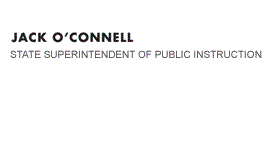Educational Interpreter Regulations


Official Letter
Official Letter
Dear Special Education Local Plan Area and State-operated Programs Directors (SELPA) and Special Education Administrators at County Offices (SEACO):
Educational Interpreter Regulations
The State Board of Education has amended two sections of Title 5 of the California Code of Regulations (CCR), Sections 3051.16 and 3065, to ensure that interpreters for pupils who are deaf or hard of hearing meet state-approved or state-recognized requirements for certification, licensing and registration or other comparable requirements.
The regulations specify the following qualification standards for educational interpreters, effective July 1, 2008:
- By July 1, 2008, an educational interpreter shall be certified by the national Registry of Interpreters for the Deaf (RID), or equivalent; in lieu of RID certification or equivalent, an educational interpreter shall have achieved a score of 3.0 or above on the Educational Interpreter Performance Assessment (EIPA), the Educational Sign Skills Evaluation-Interpreter and Receptive (ESSE-I/R), or the National Association of the Deaf/American Consortium of Certified Interpreters (NAD/ACCI) assessment. If providing Cued Language transliteration, a transliterator shall possess Testing/Evaluation and Certification Unit (TECUnit) certification, or have achieved a score of 3.0 or above on the EIPA - Cued Speech.
- By July 1, 2008, an educational interpreter shall be certified by the national RID, or equivalent; in lieu of RID certification or equivalent, an educational interpreter must have achieved a score of 3.5 or above on the EIPA, the ESSE-I/R, or the NAD/ACCI assessment. If providing Cued Language transliteration, a transliterator shall possess TECUnit certification, or have achieved a score of 3.5 or above on the EIPA - Cued Speech.
- By July 1, 2009, and thereafter, an educational interpreter shall be certified by the national RID, or equivalent; in lieu of RID certification or equivalent, an educational interpreter must have achieved a score of 4.0 or above on the EIPA, the ESSE-I/R, or the NAD/ACCI assessment. If providing Cued Language transliteration, a transliterator shall possess TECUnit certification, or have achieved a score of 4.0 or above on the EIPA - Cued Speech.
The regulations further define an "educational interpreter" as any person who provides communication facilitation between students who are deaf or hard of hearing, and others, in the general education classroom and for other school related activities, including extracurricular activities, as designated in a student's Individualized Educational Program (IEP).
Note: These regulations were originally intended to go into effect July 1, 2007. Because the regulations were not approved by the Office of Administrative Law (OAL) until March 23, 2008, the implementation date was moved forward to July 1, 2008. Consequently, there are two different standards noted in the regulations to take effect July 1, 2008. Effectively, this means that local educational agencies (LEAs) may choose to require interpreters to meet the qualifications of either standard number 1 or standard number 2 above.
All educational interpreters, whether employed by a LEA or hired by contract with an outside agency, must meet these qualification standards.
The 30th edition of the California Special Education Programs Composite of Laws does not contain these new changes. However, the amended Title 5 sections have been updated in the Special Education Division's searchable database [Note, the preceding Web site is no longer valid and has been replaced on 15-Jun-2012] Laws and Regulations: California Special Education and Related Laws. [Note, the preceding information is no longer valid.]
SELPA and SEACO Directors are responsible for notifying all pertinent district staff of this change to the California Code of Regulations.
Added 05/04/2010 - In November 2009, the State Board of Education approved policies for LEAs to follow when filing applications to waive CCR, Title 5, Section 3051.16(b)(3) [Note, the preceding link is no longer valid and has been removed]. The Waiver Office has instructions and forms on how to prepare a State Board of Education waiver for Educational Interpreters [http://www.cde.ca.gov/re/lr/wr/submit.asp]. If additional help is needed, call the Waiver Office at 916-319-0824.
Questions should be directed to Nancy Grosz Sager at nsager@cde.ca.gov or 916-327-3868 (v/tty/vp) [Note, the preceding contact information is no longer valid and has been replaced with Dr. Nancy Hlibok Amann at NHlibokAmann@cde.ca.gov].
Original signed by Mary Hudler and Ron Kadish. Hard copy of the signed document is available by contacting the State Special Schools and Services Division at 916-327-3850.
Mary Hudler, Director
Special Education Division
Ron Kadish, Director
State Special Schools and Services Division
